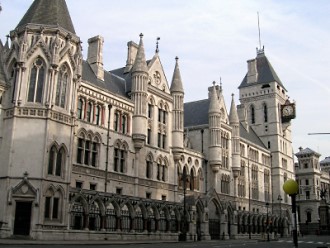Important new judgment on paragraph 322(5) controversy
In an important and eagerly awaited judgment handed down today, the Court of Appeal has allowed four appeals against refusals of indefinite leave to remain (ILR) under paragraph 322(5) of the Immigration Rules due to tax errors.
 Image credit: WikipediaEIN members can read the judgment here.
Image credit: WikipediaEIN members can read the judgment here.
The Guardian reported that the Court found that the Home Office’s use of paragraph 322(5) to try to force 1,697 highly skilled migrants out of the UK in just over three years has been “legally flawed” and must change.
The Independent said the Court ruled the Home Office has been “too ready to find dishonesty” and had not given three of the four appellants a “fair opportunity to answer the charge of dishonesty”.
The Court's press summary below has more:
_____________________________
PRESS SUMMARY
Balajigari and others v Secretary of State for the Home Department [2019] EWCA Civ 673
The Court: Underhill LJ (Vice-President of the Court of Appeal (Civil Division), Hickinbottom LJ, Singh LJ
Hand-down date: 16 April 2019
1. These four appeals against refusal of leave to remain in the UK are test cases, arising out of the Home Office policy of refusing applications in so-called "earnings discrepancy" cases. The refusals were on the basis of discrepancies between earnings figures declared in applications for leave to remain and those declared in their tax returns for equivalent periods (or, in one case, a failure to file any return).
2. The appellants in each case have challenged decisions made by the Upper Tribunal (Immigration and Asylum Chamber). The Upper Tribunal had upheld decisions by the Home Office to refuse their applications for settlement under the "Points-Based System". The Home Office refusal in each case was on the basis of paragraph 322 (5) of the Immigration Rules, which applies where it is "undesirable" to permit an applicant to remain in the UK "in the light of his conduct … character or associations or the fact that he represents a threat to national security". It contended that it had reached a proper decision that the discrepancies were the result of the appellants dishonestly mis-stating what they had earned, and that that constituted conduct of the kind caught by paragraph 322 (5). Each of the appellants says that the discrepancies were the result of innocent errors and that the Home Office's decision to the contrary was unlawful.
3. The Home Office's handling of "earnings discrepancy" cases of this kind has been controversial. The background was set out in a recent Home Office publication, Review of Applications by Tier 1 (General) Migrants Refused under Paragraph 322 (5) of the Immigration Rules. A large number of legal challenges have been brought, most of which are still pending.
4. By its judgment the Court of Appeal allows all four appeals. In three cases its principal reason is that the Home Office did not give the appellant a fair opportunity to answer the charge of dishonesty. In the fourth the principal reason is that the decision letters did not make a clear finding of dishonesty. Three of the cases are sent back to the Upper Tribunal for further consideration: the Court of Appeal does not itself make a finding either way about whether the appellant was dishonest. In the fourth, that of Mr Majumder, the Home Office decision is definitively quashed, because a different tribunal has in the meantime found that he did not act dishonestly.
5. The main points of principle decided by the Court of Appeal's decision are as follows:
(1) The dishonest submission of false earnings figures to HMRC or to the Home Office is conduct which can, and generally will, justify refusal of leave to remain under paragraph 322 (5). Contrary to what is sometimes said (though not submitted by the appellants in this case), paragraph 322 (5) is not concerned only with cases where an applicant poses a threat to national security.
(2) It is not enough that the Home Office should suspect dishonesty. An application can only be refused under paragraph 322 (5) if the decision-maker makes an actual decision that any earnings discrepancies are the result of dishonesty on the part of the applicant.
(3) Before making such a decision the Home Office must notify applicants of its concern and give them a fair opportunity to offer an explanation.
(4) The fact that HMRC may have allowed a late amendment to a tax return without imposing a penalty does not preclude the Home Office from making a finding of dishonesty, and it is not obliged to ask HMRC whether any penalty has in fact been imposed.
6. Another part of the Court of Appeal's decision considers the possible relevance of the Human Rights Act 1998 in cases of this kind, and in particular of article 8 of the European Convention of Human Rights. The Court holds that it would in principle be possible for applicants in the appellants' position to challenge a refusal of settlement under paragraph 322 (5) on the basis that it interfered with their rights under article 8. If such an interference were found, the relevant tribunal (either the First-tier Tribunal in the context of a "human rights appeal" or the Upper Tribunal on a judicial review application) would decide for itself whether the applicant had acted dishonestly. No such case had been advanced by these appellants in the Upper Tribunal, which had accordingly been limited to deciding (in addition to the other issues identified above) whether the Home Office's decision that they had acted dishonestly was "rational".
This summary is provided to assist in understanding the Court's decision. It does not form part of the reasons for the decision. The full judgment of the Court is the only authoritative document. It is published at